Culture of Corruption
PM Sogavare
Hon. Manasseh Sogavare became the prime minister of Solomon Islands at a very critical time - 2000 to 2002. At the time, no one trusted the traditional peace-reconciliation processes, and while traditional leaders were struggling to get things sorted out, the so-called 'bush militaries' (GRA/IFM and MEF) were fighting relentlessly. The Governor General at the time declared both groups - illegal organizations, which hampered all negotiations. The spokesman of the MEF, late Andrew Nori, accused the government of making things impossible to resolve. At the peace meeting in Buala, both groups failed to show up, and the MEF's spokesman attributed that to the declaration by the GG, and then urged him to lift that and give way for both sides to resolve their differences. When the GG capitulated, the MEF gave a 14-day to come up with a peace resolution.
On the 4th of June 2000, however, the SI police and the Malaita Eagle Force (MEF) merged and formed the 'SI Paramilitary Force' and overthrew the government of the former Prime Minister Ulufa'alu. The paramilitary declared war on the GRA, and then forced the GG to call a special meeting to elect the new government. When the first meeting failed to reach a quorum for the election of the PM, the paramilitary warned of more violence, prolonged curfew unless MPs returned to town and elect a new leader. The second meeting resulted in the election of former Leader of Opposition, Manasseh Sogavare. Every single evidence pointed to his election as a paramilitary-induced election.
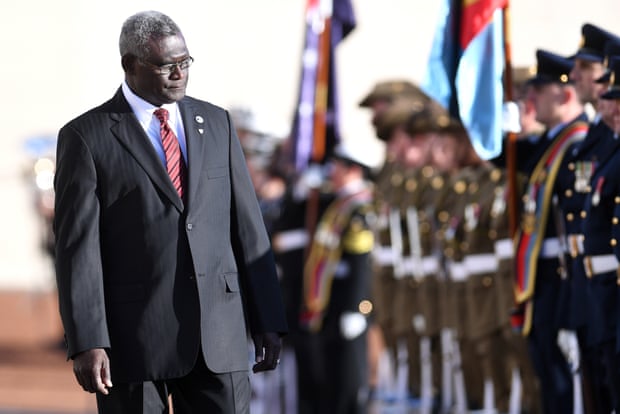 |
| Prime Minister Manasseh Sogavare |
Ghost city - Honiara, 2000
The two warring factions were still at each other’s throats, and the main city was slowly turning into a ghost town – more people left the city and returned to their home as militants and their buddies ruled the streets. At night, they put up check-points all over Honiara. In the day time, they drove around in military uniforms – showing off their power. But far from being an independent voice in the halls of government, the prime minister implemented policies that were construed as pro-militants and anti-democratic. His attitude toward the institutions and the democratic processes of the country he was elected to govern, defined his politics and future governments thereafter.
100-Days Rewarding Militants
The “100-day” concept is often used by newly elected political leaders as a government slogan. It denotes commitment to reconstruction or development. This concept is has its roots in France. It refers to the “concept of “Cent Jours” (Hundred Days),” which is the “period of 1815 between Napoleon Bonaparte’s return to Paris from exile on the island of Elba and his final defeat at the Battle of Waterloo, after which King Louis XVIII regained the French throne.” But this is more of an idea than anything else. It is simply a cute way of say – yes, I’m here and I’m going to fix the economy and everything else in three months. The mantra is based on nothing but “promises” for most political leaders. Solomon Islander leaders, and most leaders in the Pacific for that matter, love slogans that sound good to the ear of the electorates, and often after three months the slogan faded and nothing is achieved. For Sogavare, the 100-day reconstruction was everything but ‘economic development.’
Mr. Sogavare’s 100-days of “cash payback” for those who enthroned him, and a period of appeasement for the thugs who tore Solomon Islands apart since 1998 – the GRA and the IMF in particular. Emboldened by his election and his fellow supporters in parliament, Sogavare became went out of his way to “compensate” the warring factions, although they were the ones tearing the country apart. This very act was a sign of the total collapse of law and order in the country, and for analysis sake, Mr. Sogavare was simply paying these people to go away instead of trying to rebuild the crumbling economies and restore confidence in the vast majority of the country who lost faith in the government since 1998. It was a move that would have severe consequences in months ahead.
 |
| MEF and their commander Rasta Lusibaea at the surrendering of their weapons ceremony |
Four days after Sogavare was sworn in as prime minister, fighting between the Joint Paramilitary – a combined armed forces of the MEF and former SIPFF, and IFM intensified around the Alligator Creek – a territory in the eastside beyond the boundary of Honiara town. In other words, the MEF was pushing deep into Guadalcanal territory instead of protecting the city they claimed to be protecting, and put many innocent villagers at risk. This move only emboldened Guadalcanal warlord Harold Keke and his ill-armed and rugged soldiers, and further strengthened the resurrected IMF – a post-colonial movement led by the charismatic leader Moro. To them, the invasion of Guale territory by MEF justified Mr. Keke’s war on the Solomon Islands government he deemed extremely corrupt and was in collusion with the MEF to invade his territory. That battled last no longer than an hour. The Solomon Star hardcopy issue the next day displayed the grim tales of the encounter. On the front page was a picture of the paramilitary soldiers – most of them former Solomon Islands Police Field Force (SIPFF) – posing in front of their homemade tank, which was a bulldozer converted into an armored vehicle. They celebrating a successful mission. A picture of two IFM militants dressed in traditional attire lying on the ground inserted into the bottom of the story to emphasize the successful operation. The story glorified the might of the paramilitary and severed as a warning to IMF and GRA fighters of any further attempt to take down the city. At around 9 am that morning, those who bought that newspaper that morning also witnessed the jubilant paramilitary members as they drove through the heart of Honiara. They drove around town honking, chanting, celebrating, while waving their rifles in the air. In the midst of the convoy was the very bulldozer they used to invade the IMF bunker at the Alligator creek area.
However, the government was awfully, but expectedly quiet. There was no condemnation from the PM himself as he was too busy crafting plans on how to reward these militants. And at this point, it became clear that the paramilitary was the personal army of the new government because of the collapse of the SI Royal Police. Majority of law-abiding police officers, most of them from Malaita, chose to stay home and not participating in the criminal activities of the paramilitary.
The people who destroyed the country received their reward
A week since the election of Sogavare in one of the most controversial elections in the world, the award ceremony for the warrying factions took place aboard the Australian warship Tobruk. The rule of law had collapsed and the very people who destroyed it were lining up to get their reward from their puppet prime minister in one of the most absurd acts perpetrated on the country by crooked elected leaders.
The ceremony was head with the Australian representatives and the newly elected Prime Minister Hon. Sogavare presiding. They presented checks to the two provincial leaders of Malaita and Guadalcanal province - $5 millions (SBD) for Malaitan province representing the MEF, and $3 million for Guadalcanal province. The money was donated by the Australian government.
Did the money exchanged between the two groups resolve anything? Absolutely not. These people forgot the fact that every reconciliation since 1998 using various respectable customs of both warring sides, failed miserably to tamed the already raging conflict. The Sogavare approach, as we shall see, failed to resolve the crisis, and he was in fact exacerbating the crisis. Both sides, however, walked away with millions of dollars in their pockets. They did not how their actions affected the country, and the prime minister they helped elected was succumbing to the desire to reward them before his term in office expired.
Even the Australian government which called for transparency and the restoration of the rule of law since the uprising began in 1998, was also duped by the newly elected leader into funding his pro-militant agenda. In retrospect, the Australian government may have shared the same belief that if these people were paid huge sums of money, they would go away. Wrong. The money exchanged that day came straight out of the pockets of Australian taxpayers and straight into the pockets of the two provincial governments whose very people were still hiding in the jungle, arming withy Solomon Islands government’s own heavy and deadly weapons.
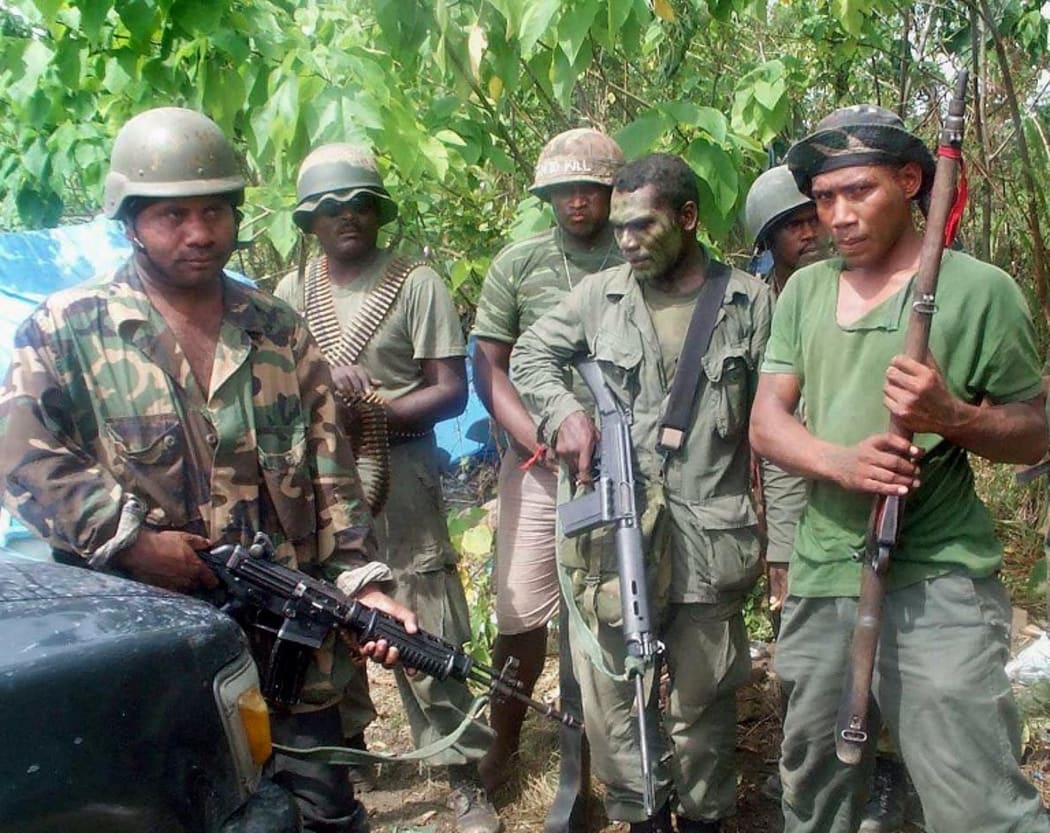 |
| Members of the Paramilitary with arms raided from the SIG's Armory at Rove |
This attempt to settle the ethnic conflict using Australian cash failed miserably because the very people who were fighting in the jungle weren’t part of exchange nor did they benefit from it. Weeks after the money exchange, members of the militants in Malaita questioned the use of the funds, and rumor had it the premier of the Guadalcanal province Ezekiel Alebua was in the Western Province flashing cash like an insane millionaire while his nephew Mr. Keke ran amok causing mayhem and occasionally sending villagers into hiding. This and many other instances demonstrated one simple truth that the leaders of both provinces, the national government and the Australian government failed to comprehend, which was – the war wasn’t about money, but territory and power. And as long as these fighters didn’t get their way, every single “kastom ceremony” was meaningless, every money dumped into the pockets of their provincial leaders was simply pocket money for the crooked leaders. The more money they poured into the warring factions, the worse the situation became. For the newly elected PM, his views were all too clear, he was the puppet of the Paramilitary, or more accurately, he was the creator of the paramilitary.
Controversial policies
Paramilitary officers for Police
At the time of his election, Sogavare was living at his home at Kolaridge. Driving by his house at Kolaridge around July 2000, one would spot a bunch of armed guards sitting outside his home chatting and laughing while the rest of Honiara descended into chaos. He was guarded by militants and some of his loyal supporters. It was unclear whether he was paying them out of his pocket, or the country and taxpayers were footing the bill for the security of premises. Whether these men had license to carry military-grade weapons or not, it remains clear because law and order had completely collapsed and it was highly likely that these men had no legal right to carry firearms let alone highly powerful assault rifles. Now as prime minister, Hon. Sogavare was set out to fulfill what many pundits believed were pledges he and these militants made upon prior to the July-4th coup.
Soldiers and police
Police recruit in the 1990s was a tedious process. One of the recruits described the recruiting process as one of the toughest assignments he’d ever undertook. It began with an examination – Basic English and Math, followed by vigorous and training which included rigorous self-defense test, physical endurance trials and mental test. The strong and the brightest advanced to the next level and then the final test. In the end, the well-prepared recruits received their awards – uniforms, certificate, and commendation. All that, however, went to naught with the collapse of law and order in Honiara when MEF militants stormed police stations and posts in and around Honiara. In an unprecedented move, the newly elected PM Sogavare to have the paramilitary - same people who toppled the Solomon Islands’ police and responsible for most of the mayhem in Honiara at the time, to be the official police force of Solomon Islands. The push-back came from opposition, arguing that the men were not conditioned, mentally, educationally, and physically to guard the nation. The debate raged on for days until the idea was defeated. The police and law and order had been restored somewhat, but for the most part, politicians – like him – were relying on militants for their safety. The paramilitary was still active throughout out the two years he was prime minister, mostly fighting off Harold Keke’s men.Extension of Parliament Term - 2 more years
Another head-scratching movement by the controversial prime minister was his move to extend his government for two more years citing the need the restore law and order, fixing the crumbling economy and restoring confidence among members of the warring factions. He argued aggressively citing the current political and social environment of the time and the need for a PM who could work together with these factions to fix the country, but as parliamentarians did defeat his attempt to use the paramilitary as the country’s police and army, and his attempt to destroy the fabric of the SI’s democracy and the rule of law. He went on to lose his bid as PM after 2002.
China's Pivot
In 2019, shortly after his election, Mr. Sogavare announced the country's recognition of China while giving Taiwan a dateline of departure, essentially ending SI and Taiwan's decades of friendship and recognition. Many people scratched their head and thought Sogavare was out of his mind. However, Sogavare's desire to recognize China didn't just emerge in 2019.
Shortly after his election in 2000, Mr. Sogavare announced his government's recognition of China. There was an uproar that followed his announcement but he plowed ahead anyway. He dispatched a team of government Ministers and experts to China to ask for a reconstruction package, China was cautious since Sogavare didn't formally end SI's diplomatic relationship with Taiwan. His team returned home with absolutely nothing. That Chinese communists didn't buy Sogavare's gesture.
Having received zero dollar from Beijing, Mr. Sogavare dispatched another team, this time to the Taiwanese embassy asking for a reconstruction package from Taiwan to the tune of $400M. The Taiwanese didn't buy his antics either - they knew Sogavare was playing them the way he played China. His team, however, returned only with $40M.
In 2002, after he lost his bid to extend parliament, he was toppled by the newly elected prime minister Allan Kemakeza. He renewed SI's commitment to Taiwan's democracy, which lasted for another 17 years before Sogavare returned with love for Beijing's money and changed everything again.
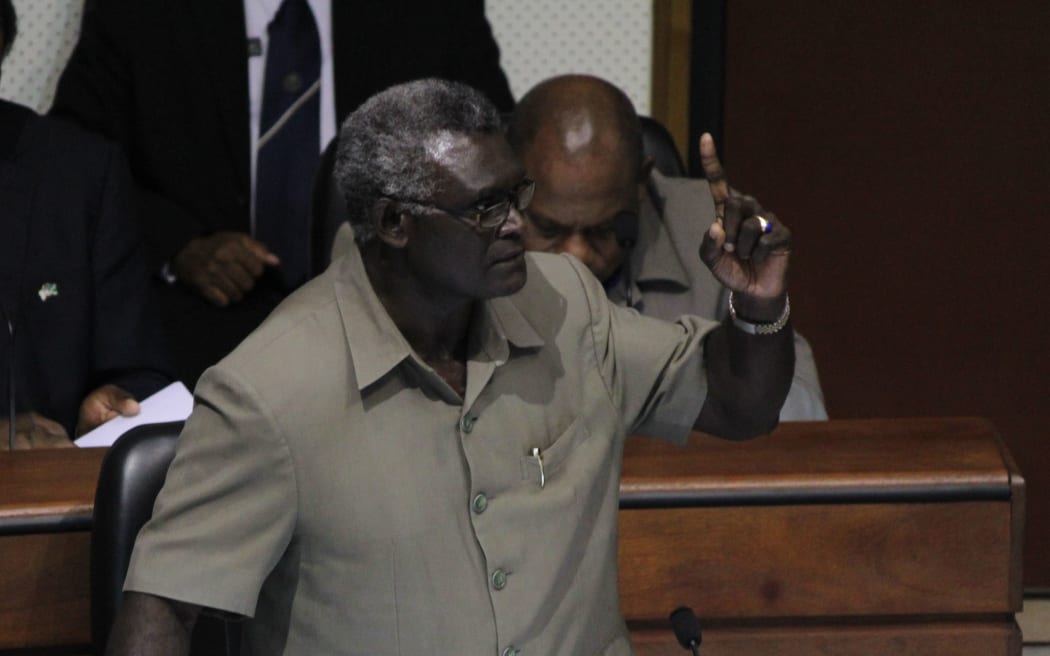
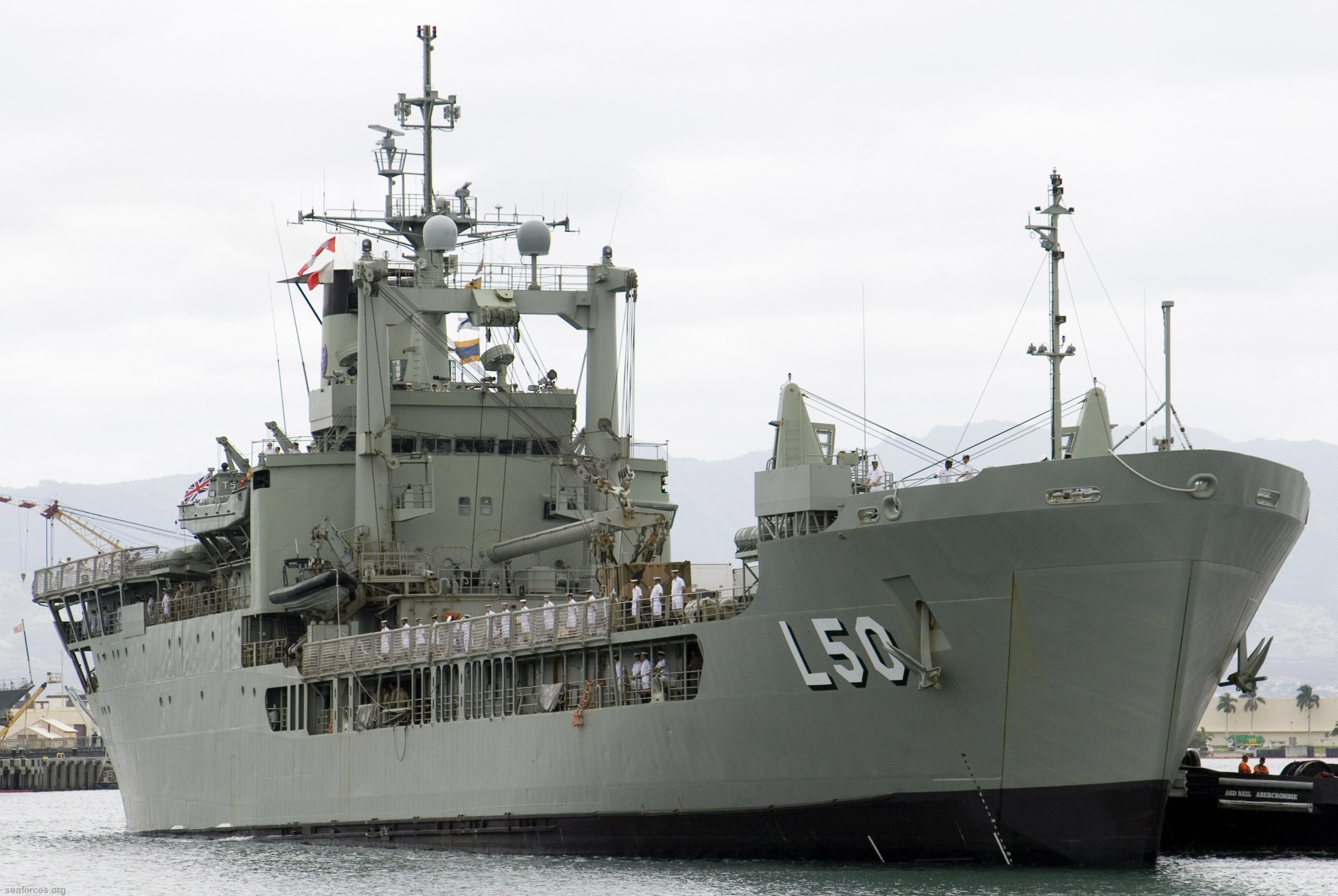

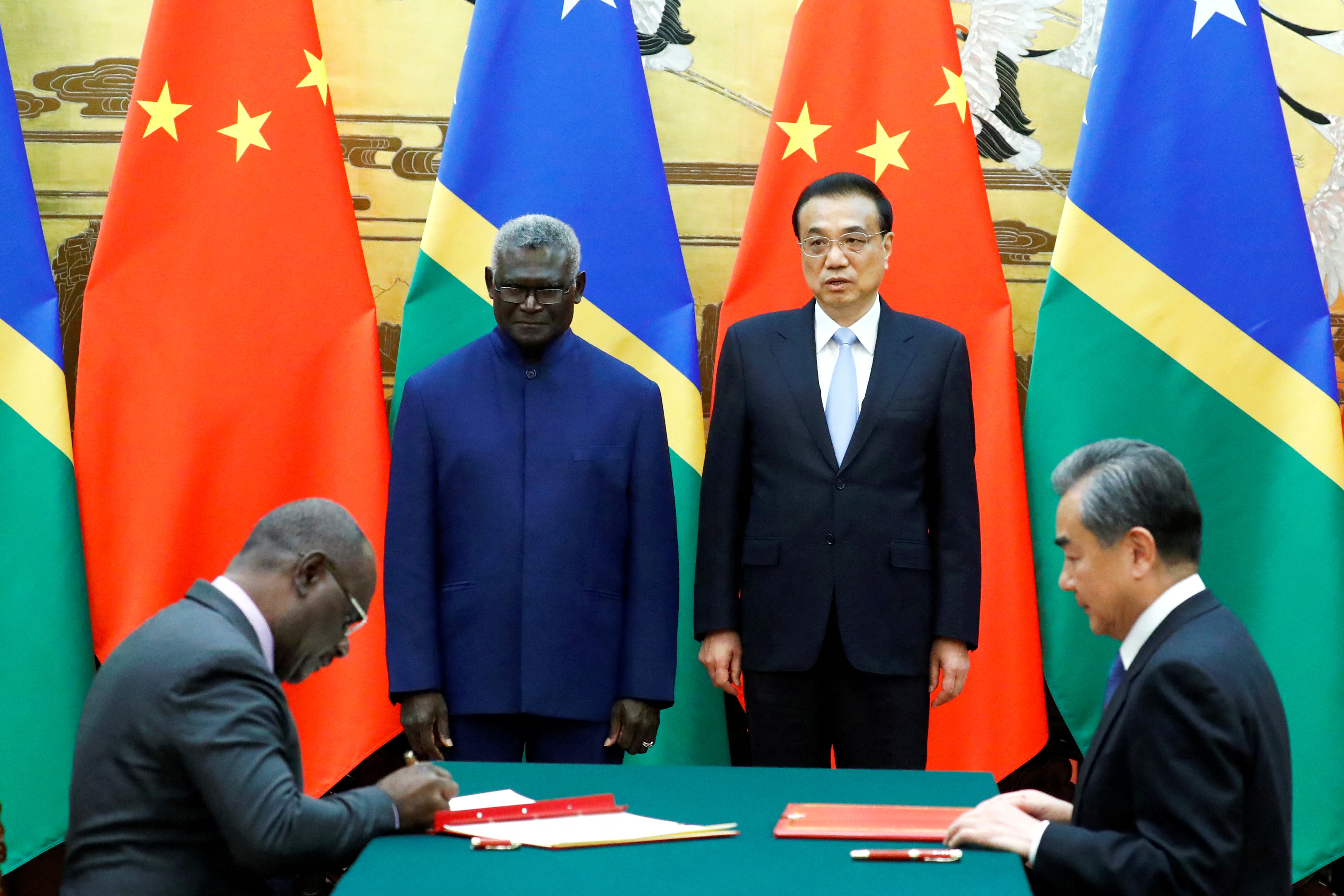
Comments
Post a Comment